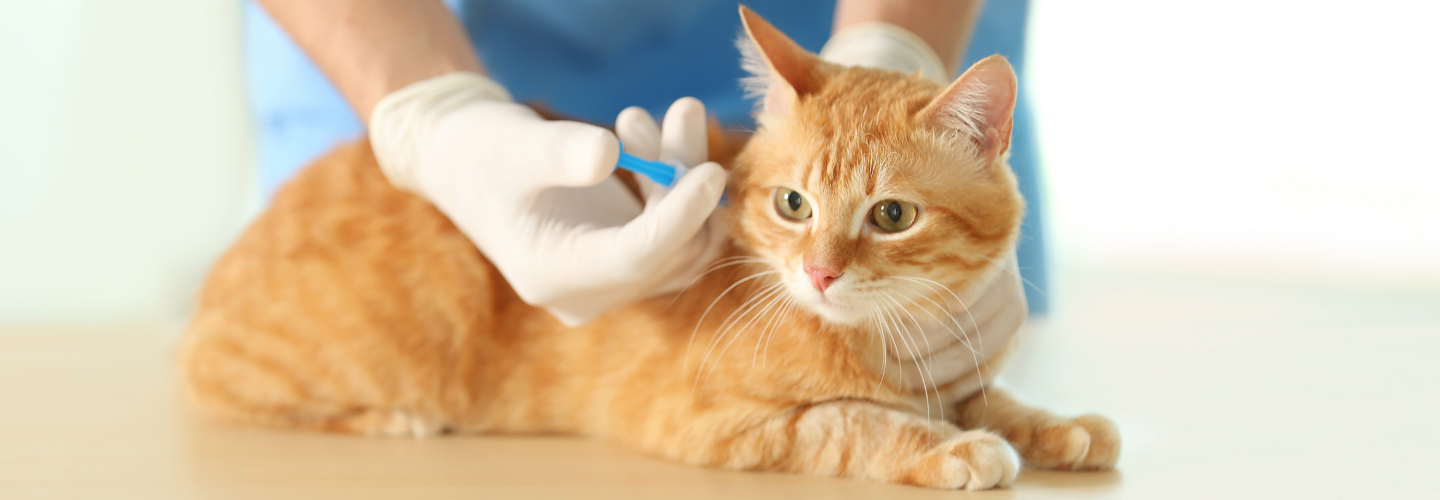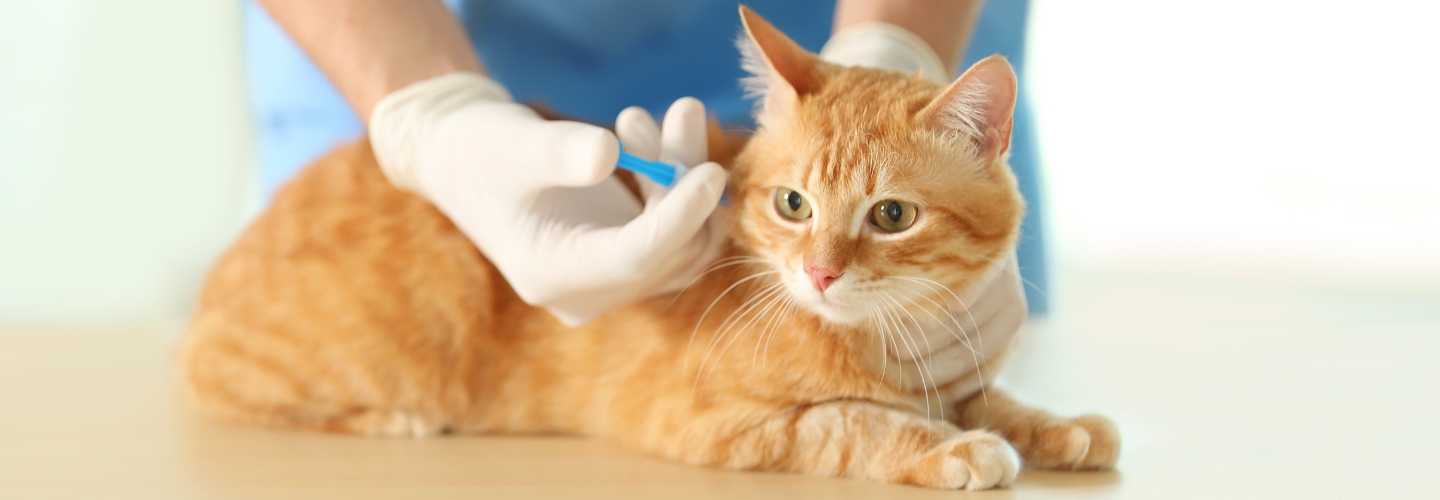It is great to have a new member in the family, but we must also plan for the future life and health of them! When a furry kid enters the house, the most important thing is to plan for its vaccinations, chip implants, and a body check to ensure the fur kid's health care in the future. We will introduce to you clearly how to choose the "multi-in-one" vaccine , different kind of chips, and what should be paid attention to during body check.
1. Get Your Fur Kids Fully Vaccinated and Chips Implanted
Kittens and puppies can rely on the antibodies of their mother's breast milk to resist from viruses when they are bornt. However, the antibodies are not enough to provide permanent protection. Therefore, it is recommended that the owner should get them vaccinated for sufficient protection. Vaccines can also be used to reduce the risk of infection for many common diseases for cats and dogs. For example, Feline Panleucopenia, the number one killer to cats, is a combination Calicivirus and Feline Rhinotrachetitis. Its contagion is high and fast that when cats are infected, it can cause serious or even fatal respiratory infections. Canine morbillivirus and Leptospirosis are very common and can be fatal to your pets too. Therefore, for the sake of pet health protection, remember to get them vaccinated on time.
Also, according to Hong Kong regulations, all five-month-old or above dogs need a Rabies Vaccine.
View this post on Instagram
What are the differences between ‘Three-in-one’, ‘Four-in-one’, and ‘Five-in-one’ Vaccine?
It is common to hear different "several-in-one" vaccines. Veterinarians in Hong Kong usually inject "three-in-one" vaccines for cats, which can prevent Calicivirus (FCV) and Feline Rhinotrachetitis (FHV) and Carnivore Protoparvovirus (FPV), also known as " Feline Panleucopenia ". And "four-in-one" vaccine – aside from having the effect of "three-in-one", the forth virus can help to prevent more different diseases, including Chlamydophila Felis, Feline Immunodeficiency (FIV), that is, "feline AIDS", and Feline Leukemia Virus (FeLV), you can ask the veterinarian for the appropriate vaccination according to the cat's body check report.
As for dogs, veterinary clinics generally provide the "five-in-one" DHPPiL vaccine, which can prevent Canine Morbillivirus, Hepatitis, Enteritis, Parainfluenza, and Leptospirosis.
Vaccination Timetable: When can Kittens and Puppies Get Vaccinated? When should Adult Cats Receive their First Vaccination?
Vaccines for cats and dogs are not completed in one shot. According to the guidelines of SPCA, cats and dogs should be vaccinated at the age of 8 to 10 weeks, 12 weeks and 16 weeks respectively, and booster doses are also required one year later. As for the Rabies Vaccine, dogs should be vaccinated at the same time at the age of 12 weeks. If cats and dogs are over the above age when they entered the house, they need to receive a booster injection every year after their first injection. However, the actual number of injections must be judged by the veterinarian after the pet is checked.
In addition, although there is no law in Hong Kong that requires cats to be vaccinated against Rabies, they can also be vaccinated, and most countries also have this requirement. Therefore, if you planned to move to another place, or your cat has the opportunity to contact with other cats outdoors, you can also ask your veterinarian for vaccination details.
If you want to know more about cat injections, you may wish to read another article on this site answered by registered veterinarian Dr. Kaylen, which also includes price references!
View this post on Instagram
Should cats be vaccinated with Three-in-one vaccine? |Cat vaccination Q&A (With Price Reference)
Details: https://petahood.com/en/blog/cat-vaccination-q-and-a
Cats Must Know! Adjuvants Contained in Vaccines Can Cause Malignancies
Some cat and dog vaccines contain "adjuvant" - an ingredient that makes the vaccine effective. It may irritate cats and cause malignant tumors. Therefore, it is recommended that owners can choose "adjuvant-free vaccine" for the cats to reduce the chance of causing tumors. Owners can also check with your veterinarian for vaccine details in advance.
What is the Differences Between AVID and ISO Chips?
The Hong Kong Law requires that owners must implant microchipping for dogs over the age of 5 months and register them under the control of the Fisheries and Conservation Department, which is commonly known as "dog tags". Cats are not subjected to legal requirements for microchip implantation, but just in case, for example, if someone finds a lost cat, the microchip can also be used to search for the owner. The Fisheries and Conservation Department currently does not have a microchip registered for cats. The owner can register the microchip information at SPCA when registering as a member.
Chips for cats and dogs are mainly divided into AVID and ISO. The number unit of the former is 9, while that of the latter is 15. ISO is an internationally recognized chip and is basically applicable all over the world. However, as e the Hong Kong Fisheries and Conservation Department mainly uses AVID chips, not every veterinary clinic also provides services for implanting ISO chips.
In most EU countries, the United Kingdom, Australia, Japan, etc. mainly use ISO chips. In other words, the local area may not be able to provide AVID chip scanners. Therefore, if you want to immigrate or travel with your pets to these countries, you must implant ISO chips for your pets. Pets can have two chips at the same time, so pets do not have to remove the AVID to implant the ISO chip, and they will not interfere with each other when scanning.
2. Do a “Complete Blood Count” Body Check to Understand the Physical Condition of Your Pets
Regardless of whether a newborn or a new cat or dog enters the house, the owner is advised to take it to the veterinarian for a physical examination to acknowledge its physical condition and make a judgment on its future medical care or the choice of vaccine. In general, the veterinarian will take the pet's body temperature, measure the heart rate, and palpate to judge the condition of the pet's fur on whether there are external parasites , as well as it seyes, ears, mouth and nose, etc. In addition, blood tests are mainly used. It is recommended to test the complete blood index (CBC) for pets, that is, to test the red and white blood cells and certain chemical indexes to reflect the conditions of the pet's kidneys, liver, pancreas, stomach, etc., and to know whether it has dehydration, anemia, bacterial infection, as well as the blood coagulation function or immune system response ability, etc. In addition, the owner can also perform additional thyroid, adrenal, heartworm rapid tests and pancreas index tests for a comprehensive physical examination.
Thereafter, it is also recommended that the owner to conduct an annual inspection for the pet. For fur kids without any symptoms and medical history, some clinics also provide a "half blood" test with fewer items than the full blood test. The price is cheaper but it can also check the general items, but the content of each clinic is different, you can then inquire with the clinic for details.
In addition to avoid cats and dogs being excited or over panic, it is recommended to fast for 4 to 6 hours before the physical examination to ensure a more accurate blood test. Water deprivation is not necessary, but different inspection items may have different fasting or water deprivation conditions, it is better to check with the veterinarian before the inspection. If you find parasites in the feces before the inspection, remember to keep them and bring them to the clinic for inspection together. If there is abnormal skin or facial features, hands and feet, you should also remember to take pictures so that the veterinarian can clearly understand the pet's condition.
View this post on Instagram
3.Bookmark the 24 Hours Veterinary Clinic Nearby in Advanced!
Many pet owner beginners will also forget this, that is, to search in advance and choose a veterinary clinic near home, especially a clinic that provides 24-hour emergency services. Understanding its reputation, price and business hours, etc, so that you will not get panic when your pet gets sick suddenly. You can also buy more golden treatment time for your pet, and to avoid blindly entering a veterinary clinic with a bad reputation.
PET-A-HOOD also provides information on veterinary clinics in Hong Kong. Even if you are in an emergency, you can quickly find a nearby clinic. You might as well bookmark it now!
PET-A-HOOD Hong Kong 24 Hours Emergency Assistance Veterinary Clinic Research Details:
https://petahood.com/en/category/pet-services/veterinary/24-hour-emergency-assistance
PET-A-HOOD Hong Kong Veterinary Clinic Research Details:
https://petahood.com/en/category/pet-services/veterinary
About PET-A-HOOD
Our platform is a one-stop destination for the latest and the most comprehensive pet-related information. From helping you discover pet-friendly businesses nearby, to planning fun weekend activities, we are your trusted partner when it comes to curating a healthy and exciting lifestyle for your pet friends and you. We also encourage pet owners to build their Pet’s Social Community through Pet-a-hood, by exchanging pet-caring experience, pet-related news, and connecting with other pet lovers in the neighbourhood.




